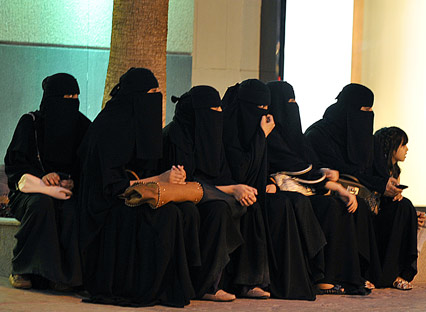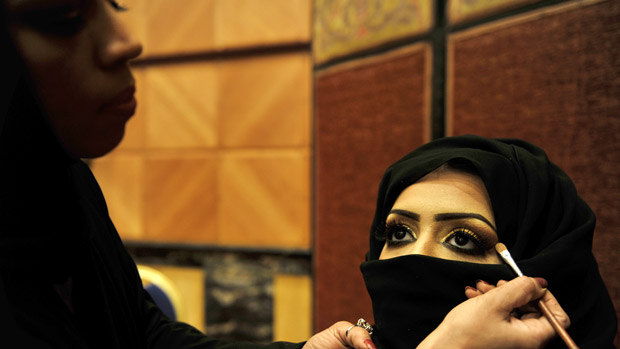Eleven things women in Saudi Arabia cannot do
Ban on women entering a Starbucks store in Riyadh is latest in long line of restrictions

A free daily email with the biggest news stories of the day – and the best features from TheWeek.com
You are now subscribed
Your newsletter sign-up was successful

Wear clothes or make-up that "show off their beauty"
The dress code for women is governed by a strict interpretation of Islamic law and is enforced to varying degrees across the country.
Saudi Arabia is one of the only Muslim-majority countries that legally imposes a dress code.
The majority of women are forced to wear an abaya – a long black cloak – and a head scarf.
The Week
Escape your echo chamber. Get the facts behind the news, plus analysis from multiple perspectives.

Sign up for The Week's Free Newsletters
From our morning news briefing to a weekly Good News Newsletter, get the best of The Week delivered directly to your inbox.
From our morning news briefing to a weekly Good News Newsletter, get the best of The Week delivered directly to your inbox.
The abaya covers their everyday clothing.
The face does not necessarily need to be covered, "much to the chagrin of some hardliners," says The Economist.
But this does not stop the religious police from harassing women for exposing too much flesh or wearing too much makeup.
The dress code was extended to all female television presenters earlier this year.
A free daily email with the biggest news stories of the day – and the best features from TheWeek.com
The king's advisory body, the Shoura Council, ruled that the women should wear "modest" clothes that do not "show off their beauty", according to Arab News.
Expats are given some leeway, especially in their private residences. Michelle Obama's visited Saudi Arabia in colourful, loose-fitting clothing and no headscarf in 2015.
Click to page 4 to discover other things women in the Muslim kingdom are still unable to do.
- Top Gear Cenotaph Stunt - 'Clarkson Never Had Such Bad Taste'
- House prices: what are the predictions for 2016?
- EU referendum: Brexit could be 'disaster' for UK
-
 Local elections 2026: where are they and who is expected to win?
Local elections 2026: where are they and who is expected to win?The Explainer Labour is braced for heavy losses and U-turn on postponing some council elections hasn’t helped the party’s prospects
-
 6 of the world’s most accessible destinations
6 of the world’s most accessible destinationsThe Week Recommends Experience all of Berlin, Singapore and Sydney
-
 How the FCC’s ‘equal time’ rule works
How the FCC’s ‘equal time’ rule worksIn the Spotlight The law is at the heart of the Colbert-CBS conflict
-
 Epstein files topple law CEO, roil UK government
Epstein files topple law CEO, roil UK governmentSpeed Read Peter Mandelson, Britain’s former ambassador to the US, is caught up in the scandal
-
 Iran and US prepare to meet after skirmishes
Iran and US prepare to meet after skirmishesSpeed Read The incident comes amid heightened tensions in the Middle East
-
 Israel retrieves final hostage’s body from Gaza
Israel retrieves final hostage’s body from GazaSpeed Read The 24-year-old police officer was killed during the initial Hamas attack
-
 China’s Xi targets top general in growing purge
China’s Xi targets top general in growing purgeSpeed Read Zhang Youxia is being investigated over ‘grave violations’ of the law
-
 Panama and Canada are negotiating over a crucial copper mine
Panama and Canada are negotiating over a crucial copper mineIn the Spotlight Panama is set to make a final decision on the mine this summer
-
 Why Greenland’s natural resources are nearly impossible to mine
Why Greenland’s natural resources are nearly impossible to mineThe Explainer The country’s natural landscape makes the task extremely difficult
-
 Iran cuts internet as protests escalate
Iran cuts internet as protests escalateSpeed Reada Government buildings across the country have been set on fire
-
 US nabs ‘shadow’ tanker claimed by Russia
US nabs ‘shadow’ tanker claimed by RussiaSpeed Read The ship was one of two vessels seized by the US military